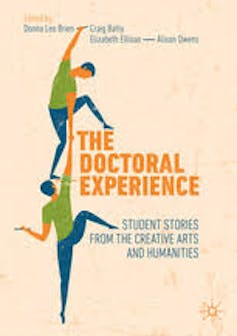Source: The Conversation (Au and NZ) – By Craig Batty, Professor of Creative Writing, University of Technology Sydney
Doctoral students show high levels of stress in comparison to other students, and ongoing uncertainty in terms of graduate career outcomes can make matters worse.
Before the pandemic, one in five research students were expected to disengage from their PhD. Disengagement includes taking extended leave, suspending their studies or dropping out entirely.
COVID-19 has made those statistics far worse. In a recent study, 45% of PhD students surveyed reported they expected to be disengaged from their research within six months, due to the financial effects of the pandemic.
Many factors influence whether a student completes their doctorate. They include supervision support (intellectual and pastoral), peer support (colleagues, friends and family), financial stability and good mental health.
In our recently published book The Doctoral Experience Student Stories from the Creative Arts and Humanities – which we edited with contributions from PhD students – students outlined their experiences of doing a doctorate and shared some useful strategies for how to keep going, and ultimately succeed, in the doctoral journey.
A deeply personal journey
Completing a doctorate involves much more than generating knowledge in a specific discipline. It is a profoundly transformational process evolving over a period of at least four years — and often longer.
This entails personal questioning, development in many areas of life, and often a quite significant personal and intellectual reorientation. The PhD brings with it high expectations, which in turn creates high emotional stakes that can both inspire and derail students. This is coupled with coming to see and think about the world very differently — which for some can be a daunting prospect, as all previously held assumptions are thrown into disarray.
Such a profoundly existential process can itself engender anxiety, depression and trauma if students are not equipped with the self-care strategies that enable resilience.
Read more: PhD completion: an evidence-based guide for students, supervisors and universities
Every chapter in our book, written by a different student, emphasises the need to engage in deep thinking and planning regarding their personal goals, strengths and weaknesses, and ways of working before starting the PhD.
This is important preparatory work to ensure any challenges that arise are surmountable.
In her chapter, Making Time (and Space) for the Journey, AK Milroy writes she learnt to
[…] analyse and break down the complicated doctoral journey into a manageable, achievable process with clear tasks and an imaginable destination.
She writes this includes involving family and friends in the process because
[…] it is paramount to ensure these people understand the work that lies ahead, and also that they too are being respected by being included in the planning.
Relationships were, above all, a critical component of the experience for many of the student writers. The supervisory relationship is the most obvious one, which Margaret Cook describes as the student undertaking a form of academic apprenticeship.
Read more: Ten types of PhD supervisor relationships – which is yours?
The student authors also identify strategies for the “thinking” part of the research process once enrolled. These include acknowledging that the free and creative element of mind-wandering and downtime are as legitimate as the focused, task-oriented work of project management, such as preparing checklists and calendars.
AK Milroy calls these “strategic side-steps”.
Peter Mackenzie, who researched regional jazz musicians, went a step further to connect with his participants.
I felt like an outsider but once I started to play with the guys on the bandstand that night at the Casino, I sensed a different level of appreciation from them. After playing and taking on some improvisations, I could feel the group relax. I was no longer an outside musician. Even better, I wasn’t seen as an academic. I was one of them.
Struggling with self doubt
The task of writing, of course, cannot be ignored in the long doctoral journey.
Drafting and redrafting, jettisoning ideas and arguments along the way, is acknowledged as a core component of the doctoral learning process itself, and the many attempts are not proof of failure.

Gail Pittaway writes about extending networks beyond one’s supervisors and university to collaborate with those in the discipline nationally and internationally.
This can be productive and lead to co-written articles and editing special issues of journals, which can positively influence the PhD thesis.
[…] by developing confidence in sharing ideas, seeking peer review feedback and editorial advice from a wider range of readers as some of these sections are submitted for publication, the writing of the thesis is encouraged and energised.
Many of the student authors acknowledge questioning, self-doubt and fear of the unknown are central to creating and performing research. While this might be frightening, they say it should be embraced as this is where innovation and novelty can arise.
Charmaine O’Brien writes about how transformative learning is dependent on this period of complexity and not-knowing. While “failure to make experience conform to what we already know is threatening because it destabilises a sense of how we know the world, and ourselves in it, resulting in psychological ‘dis-ease’”, staying with it – and having supportive supervisors – ensures the student becomes a doctoral-level thinker.
Read more: Mindfulness can help PhD students shift from surviving to thriving
Lisa Brummel writes of extending requirements of occupational health and safety into her own life. This takes forms such as family, friends and exercise, assisting with work-life balance and good mental health.
After all, two of the most significant resources PhD students possess to do the work required are their physical and mental capacity.
Finally, students must love their topic. Without an innate fascination for the field in which they are researching, this often tumultuous intellectual, emotional and personal journey may derail.
In the four-plus years spent doing a doctoral degree, any range of major life events can occur. Births, deaths, marriages, separations and divorces, illnesses and recovery, are all possible. Being willing to seek help and knowing who to ask can be the difference between completing and collapsing.
There is no pleasure without pain in the doctoral journey, but with the right frame of mind and supportive supervisors, the joys certainly outweigh the suffering.
– ref. 1 in 5 PhD students could drop out. Here are some tips for how to keep going – https://theconversation.com/1-in-5-phd-students-could-drop-out-here-are-some-tips-for-how-to-keep-going-131902







